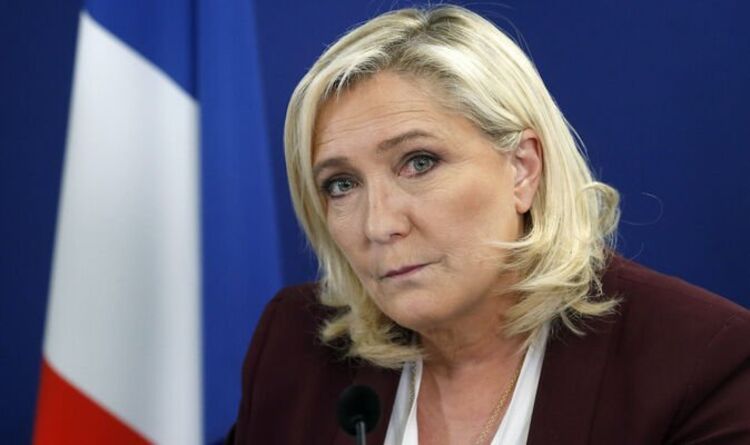Russia: Macron criticises Marine Le Pen over ‘ambiguity’
We use your sign-up to provide content in ways you’ve consented to and to improve our understanding of you. This may include adverts from us and 3rd parties based on our understanding. You can unsubscribe at any time. More info
Marine Le Pen is again a top two frontrunner in the 2022 French elections, having previously faced Emmanuel Macron in 2017. At the time she emerged as an outside candidate with little chance of winning and ultimately finished 30 points below the incumbent President. But Ms Le Pen has closed the distance in 2022, and recent polling has given her an edge that could see her become France’s first far-right and female President.
French nationals will arrive at polling stations for the first of two presidential votes on Sunday, April 10.
They will mark a favourite of 13 candidates and the two most popular progress to the next round.
Polling suggests those two will be the incumbent Mr Macron – seeking the first presidential re-election in two decades – and his longtime far-right rival Ms Le Pen.
Predicting a second-round winner is more challenging, according to Atlas Politico, as it could see an upset with Ms Le Pen winning the Presidency by a single point.
Polling conducted by the firm between April 4 and 6 shows that, while Mr Macron would win in the first round with 27 percent to Ms Le Pen’s 21 percent, a hypothetical runoff would flip their positions.
Atlas Political found that Mr Macron would receive approximately 49.5 percent of votes in the following round, while Ms Le Pen would take 50.5 percent.


The poll is the first ever to give the National Rally leader the edge over her centrist rival, both in 2022 and 2017.
The slim majority would ultimately hand her Mr Macron’s mandate until 2027.
But with just one point between them, the incumbent President may challenge the result.
Typically, when one candidate wins with a proportion of the vote with a lead in the low single figures, the other can demand a recount.
There is little precedent of this in a French Presidential election, however.
Ms Le Pen remains an unlikely winner, according to other polls.

Aggregation conducted by Politico of every available poll shows that she still lags behind Mr Macron by five points.
He is the first choice candidate for an average of 27 percent of voters across the polls, while Ms Le Pen is only first on 22 percent.
In second round preference, Politico predicts Mr Macron can increase his lead by one point, gaining 53 percent of votes to Ms Le Pen’s 47 percent.
That doesn’t mean the French President does not see her as a threat, however.
He is likely aware that she has effectively whittled down his lead since the 2017 election, which he won comfortably by a 32 percent margin with 66 percent of the vote.
Mr Macron has attacked the resurgence of the far-right in France, addressing its underlying agenda.

In an interview earlier this week, he said the movement in his country was “fundamentally” the same.
He insisted it attacked the Republic and came with a base of antisemitism, “very clear xenophobia” and “ultraconservative aims”.
Mr Macron also said the movement thrives on fear and cited the climate, geopolitics and the pandemic.
While claiming he “tried to bring answers”, he said the far-right had a different strategy.
When encountering “fears and big changes” he claimed those within the camp found that “scapegoating” works “much better”.
While immigration is an issue of note in France, and one Mr Macron has addressed extensively in the last five years, it is not this that has given National Rally a new purchase.
Ms Le Pen’s new attractiveness as a Presidential frontrunner lies in her sanitised party policy – with a host of economic proposals.
Polling has found French residents are most concerned about issues of purchasing power and social security, both of which are currently in fragile positions as a cost of living crisis bites.
The National Rally manifesto promises to scrap income tax for under-30s, reduce energy VAT to 5.5 percent and hold it at zero for essential products.
At the same time, the party has promised to lower the retirement age to 60 and scrap inheritance tax for low-income families.
They are more progressive than those offered by Mr Macron, who wants to raise the retirement age to 65.
But her policies surrounding immigration and Islam remain highly contentious and considered highly discriminatory by observers.
Candidates with near-identical social policies to Ms Le Pen, such as Eric Zemmour, have failed to attract the same support, as he is polling at nine percent.
The more radical far-right contender offers a less extensive economic programme, showing the French people are more enticed by financial policy.
Source: Read Full Article
